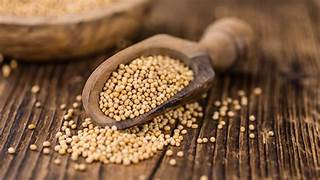Market Growth: The Mustard Seed market is flourishing as demand for diverse flavors, healthy eating, and culinary exploration drives its expansion. The market’s growth is propelled by factors such as increased awareness of the health benefits of mustard seeds, growing interest in global cuisines, and the versatility of mustard products. The market includes various forms of mustard seeds, ranging from whole seeds to ground mustard and condiments.
For More insights into the, Request a Sample of this Report:
Market Dynamics: The Mustard Seed market is shaped by dynamic forces that influence its trajectory. The seeds’ inclusion in traditional dishes, along with their health-promoting properties, contributes to market growth. Variability in mustard seed types, such as black, brown, and white, allows for a wide range of culinary applications. Market growth is also impacted by supply chain dynamics, including weather conditions affecting crop yields.
Mustard seeds are primarily high in vitamins and B-complex vitamins such as folates and niacin, vitamin B-6 and pantothenic acid, which boost enzyme production necessary for nervous system function. Furthermore, mustard seed oil has traditionally been used to cure muscular discomfort, arthritic pain, cancer risk prevention, asthma, and a variety of other body problems, leading to mustard seeds market expansion throughout the forecast period.
Mustard seeds are high in vitamins C and K, as well as thiamin, riboflavin, vitamin B6, and folic acid. They provide a considerable quantity of dietary fiber as well as a variety of bioactive components such as polyunsaturated fatty acids and antioxidants.
Market Trends:
- Health and Wellness Drive: The recognition of mustard seeds as a source of antioxidants, minerals, and other health benefits propels their incorporation into health-conscious diets and functional foods.
- Global Culinary Exploration: As consumers explore international cuisines, mustard seeds find their way into a variety of dishes, from Indian curries to gourmet spreads.
- Artisanal Condiments: Mustard-based condiments, ranging from traditional to innovative flavors, appeal to consumers seeking unique taste experiences and natural ingredients.
- Sustainable Sourcing: The focus on sustainable and organic agriculture extends to mustard seeds, driving demand for responsibly sourced products.
Market Competitive Analysis: The Mustard Seed market presents a competitive landscape with established brands, specialty producers, and artisanal players. Leading brands emphasize quality, processing methods, and flavor consistency. Artisanal producers often emphasize unique flavor profiles and traditional preparation techniques.
Regional Analysis:
- North America: Mustard seeds are a staple in North American cuisine, with applications ranging from traditional hot dogs to gourmet dishes. The region boasts a diverse mustard product market.
- Europe: Europe has a rich history of mustard consumption, with countries like France, Germany, and the UK known for their distinctive mustard varieties and condiments.
- Asia-Pacific: Mustard seeds are integral to the cuisines of countries like India, where they are a key spice. The region’s diverse culinary landscape drives mustard seed consumption.
- Latin America: Mustard seeds are increasingly used in Latin American cuisines, particularly in condiments and flavoring for dishes such as empanadas and sauces.
- Middle East and Africa: The region’s culinary diversity provides opportunities for mustard seed applications in various traditional dishes and condiments.
In conclusion, the Mustard Seed market’s growth is driven by consumers’ exploration of flavors, health considerations, and culinary experimentation. From traditional condiments to modern applications, mustard seeds play a significant role in enhancing the taste and nutritional value of dishes across the globe.
